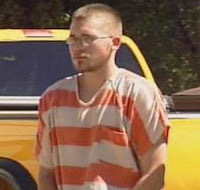My sister told me that I should listen to the most recent episode of
This American Life.
It's really interesting, particularly for people who often hear that they are unloveable, because the show really questions what it really means to love. The first half of the show is about a family who adopts a
Romanian orphan. The mother believed strongly that people should do things that they're capable of, and she felt capable of adopting a child, even one with special needs. The son, Daniel, was ok for the first 6 months, then rapidly deteriorated when it finally became clear to him that his birth parents had abandoned him to spend his first 7 years living in a crib, and he misdirected his hatred to his adoptive parents.
Daniel was diagnosed with attachment disorder, characterized by a lack of empathy and lack of conscience. Daniel threatened his parents several times, including holding a knife to his mother's throat. His mom stopped teaching him how to read because, in an era of Columbine, she worried that he would independently research ways to hurt her or others. When asked how she could love someone who is homicidal, she responded "Because he was my son! I mean you have to love him or else there's no way out of it. . . . I don't think I ever questioned my love." His mom stayed with him even after the dad had to hire a bodyguard to protect the mom from the son's outbursts, even when an acquaintance of hers and a friend and mentor of Daniel's, also diagnosed with attachment disorder, committed cold-blooded murder.
Daniel started attachment therapy, including a period of 8 weeks in which he could not be more than three feet away from his mother. After that, he ceased to be violent but still stole. He then began "holding therapy", where for 20 minutes a night his parents would cradle their thirteen year old hulk of a son in their laps and feed him ice cream while looking in their eyes and trying to bond. Daniel began to transform, began to help around the house, made friends, and had his old furniture moved back into his room (previously removed as a throwing hazard). His parents raised him to be Jewish, hoping that the religious instruction would help him acquire something of a conscience. After years of being a very poor divinity student, to the extent that he would frequently be taken away from the temple in police cars, he was finally given an award for best student in his confirmation class. In his speech he thanks his parents, saying that he loved them very much. His mom says that it was the most spectacular moment of her life.
Despite all of this, his mother still thinks that it is not possible to teach love. "I don't think the goal was ever love, the goal was attachment . . . I think you can work really hard to create an environment where you can form attachment. You want to create these situations where it's more advantageous for them to attach than to keep doing things their own way and being in their own world, isolated." When asked if she feels loved by Daniel, "Yeah, I feel love . . . I don't think he wants to hurt me, I don't worry about that at all." Although this is not the type of "love" that most people think of as love, the narrator imagines that the mother's pragmatism is exactly what has made her so successful:
"If you're the kind of person who actually needs love, really needs love, chances are you're not the kind of person that's going to have the wherewithal to create it. Creating love is not for the soft and sentimental among us. Love is a tough business."
I liked the idea that a practical approach can really be effective in instilling a sense of attachment (love?) in someone who otherwise seemed incapable of attachment. You can't force someone to love you, but you can indirectly influence them, incentivize them to want to attach. I feel like there are a lot of interesting pieces of advice for parents of a sociopath.
Other interesting parts include the first 5-10 minute discussion about how it used to be a Truth in psychology that parental love was unnecessary and even unhealthy for children. It makes you realize how young and flawed a "science" psychology is.

.JPG)










.png)






